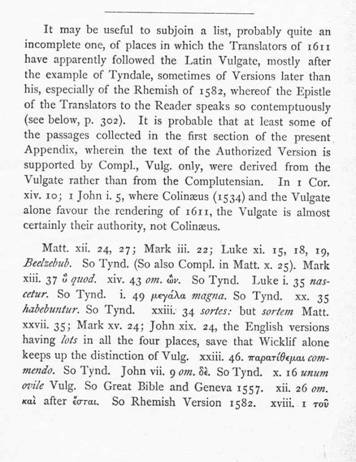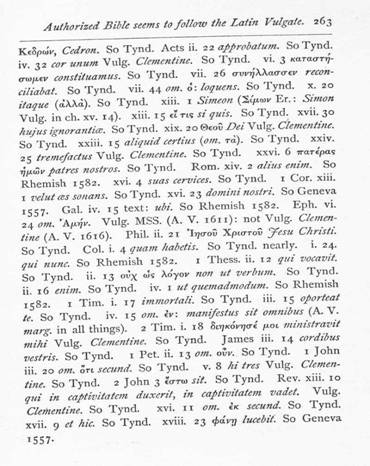Who Was F.H.A. Scrivener?

Scrivener was the undisputed expert in the 19th
century of the existing Greek New Testament manuscripts, and on the KJV in
its various editions. He did a thorough study of these ancient texts and
published many of his findings. For example it was his opinion that some
parts of the KJV follow only loosely the Greek text but very closely the
Latin Vulgate.
“In some places the Authorised
Version corresponds but loosely with any form of the Greek original, while
it exactly follows the Latin Vulgate,”
(F. H. A. Scrivener, The New Testament in Greek
according to the Text Followed in the Authorized Version. Cambridge:
University Press, 1881; p. ix. The appendix on pp. 655-6 gives a list of
the places corresponding exactly with the Latin Vulgate against the Greek).


Scrivener’s textus receptus
The KJV translators relied extensively on the work of
William Tyndale and other English bibles. So at certain places it was not
clear what the Greek basis of the NewTestament was. After labouring through
eighteen editions of the textus receptus, F. H. A. Scrivener produced an
edition of the Greek New Testament which reflects the Textus Receptus
underlying the King James Version. Scrivener’s TR was published in 1894.
Many VPP advocates identified
Scrivener’s TR as the perfectly preserved Word of God identical to the
autographa. However, Scrivener does not hold to such extreme views.
His statements debunk the
claims of VPP
“If we extend our researches to
the manuscript copies of Scripture…. we see in the very best of them
variations which we must at once impute to the fault of the scribe.” ‘INTRODUCTION
TO THE CRITICISM OF THE NEW TESTAMENT’ (Cambridge: Deighton, Bell, and Co.,
1883. Third edition)
Scrivener On Inspiration And Preservation.
The following are taken from
the first few pages of the book by F.H.A.Scrivener “INTRODUCTION TO THE
CRITICISM OF THE NEW TESTAMENT (Cambridge: Deighton, Bell, and Co., 1883.
Third edition)
1. When God was pleased to make
known to man His purpose of redeeming us through the death of His Son, He
employed for this end the general laws, and worked according to the ordinary
course of His Providential government, so far as they were available for the
furtherance of His merciful design. A revelation from heaven, in its very
notion, implies supernatural interposition; yet neither in the first
promulgation nor in the subsequent propagation of Christ's religion, can we
mark any waste of miracles. So far as they were needed for the
assurance of honest seekers after truth, they were freely resorted to:
whensoever the principles which move mankind in the affairs of common life
were adequate to the exigencies of the case, more unusual and (as we might
have thought) more powerful means of producing conviction were withheld, as
at once superfluous and ineffectual. Those who heard not Moses and the
prophets would scarcely be persuaded, though one rose from the dead.
2. As it was with respect to the
evidences of our faith, so also with regard to the volume of
Scripture. God willed that His Church should enjoy the benefit of His
written word, at once as a rule of doctrine and as a guide unto holy living.
For this cause He so enlightened the minds of the Apostles and Evangelists
by His Spirit, that they recorded what He had imprinted on their hearts or
brought to their remembrance, without the risk of error in anything
essential to the verity of the Gospel. But this main point once secured, the
rest was left, in a great measure, to themselves. The style, the tone, the
language, perhaps the special occasion of writing, seem to have depended
much on the taste and judgment of the several penmen. Thus in St. Paul's
Epistles we note the profound thinker, the great scholar, the consummate
orator: St. John puts forth the simple utterings of his gentle, untutored,
affectionate soul: in St. Peter's speeches and letters may be traced the
impetuous earnestness of his noble yet not faultless character. Their
individual tempers and faculties and intellectual habits are clearly
discernible, even while they are speaking to us in the power and by the
inspiration of the Holy Ghost.
3. Now this self-same parsimony in
the employment of miracles which we observe with reference to Christian
evidences and to the inspiration of Scripture, we might look beforehand,
from the analogy of divine things, when we proceed to consider the methods
by which Scripture has been preserved and handed down to us. God might,
if He would, have stamped His revealed will visibly on the heavens, that all
should read it there: He might have so completely filled the
minds of His servants the Prophets and the Evangelists, that they should
have become mere passive instruments in the promulgation of His counsel, and
the writings they have delivered to us have borne no traces whatever of
their individual characters: but for certain causes which we can perceive,
and doubtless for others beyond the reach of our capacities, He has chosen
to do neither the one nor the other. And so again with the subject we
propose to discuss in the present work, namely, the relation our existing
text of the New Testament bears to that which originally came from
the hands of the sacred penmen.Their autographs might have
been preserved in the Church as the perfect standards by which all
accidental variations of the numberless copies scattered throughout the
world should be corrected to the end of time: but we know that these
autographs perished utterly in the very infancy of Christian history. Or if
it be too much to expect that the autographs of the inspired writers should
escape the fate which has overtaken that of every other known relique of
ancient literature, God MIGHT have so guided the hand or fixed the devout
attention both of copyists during the long space of fourteen hundred years
before the invention of printing, and of compositors and printers of the
Bible for the last four centuries, that no jot or tittle should have
been changed of all that was written therein. Such a course of Providential
arrangement we must confess to be quite possible, but it could have been
brought about and maintained by nothing short of a continuous, unceasing
miracle;--by making fallible men (nay, many such in every generation) for
one purpose absolutely infallible. If this complete identity of all copies
of Holy Scripture prove to be a fact, we must of course receive it as such,
and refer it to its sole Author: yet we may confidently pronounce
beforehand, that such a fact could not have been reasonably anticipated, and
is not at all agreeable to the general tenour of God's dealings with us.
4. No one who has taken the
trouble to examine any two editions of the Greek New Testament needs
to be told that this supposed complete resemblance of various copies of the
holy books is not founded in fact. Even several impressions derived from the
same standard edition, and professing to exhibit a text positively the same,
differ from their archetype and from each other, in errors of the press
which no amount of care or diligence has yet been able to get rid of. If we
extend our researches to the manuscript copies of Scripture or of its
versions which abound in every great library in Christendom, we see in the
very best of them variations which we must at once impute to the fault of
the scribe, together with many others of a graver and more perplexing
nature, regarding which we can form no probable judgment, without calling to
our aid the resources of critical learning
[pp.1-3, bold has been added].